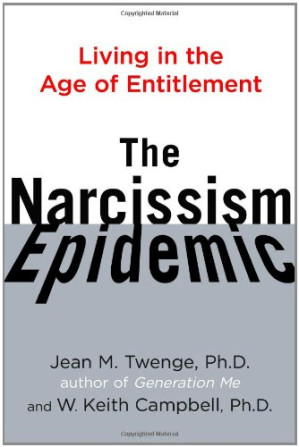The Narcissism EpidemicLiving in the Age of Entitlement
Jean M. Twenge, W. Keith Campbell
,
|

|
 Zusammenfassungen
Zusammenfassungen
 Narcissism -- a very positive and inflated view of the self -- is everywhere. It's what you have if you're a politician and you've strayed from your wife, and it's whyÊfive times as many Americans undergo plastic surgery and cosmetic procedures today than did just ten years ago. It's the value that parents teach their children with song lyrics like "I am special. Look at me, " the skill teenagers and young adults obsessively hone on Facebook and MySpace, and the reason high school students physically beat classmates and then broadcast their violence on YouTube for all to see. It's the message preached by prosperity gospel and the vacuous ethos spread by celebrity newsmakers. And it's what's making people depressed, lonely, and buried under piles of debt.
Narcissism -- a very positive and inflated view of the self -- is everywhere. It's what you have if you're a politician and you've strayed from your wife, and it's whyÊfive times as many Americans undergo plastic surgery and cosmetic procedures today than did just ten years ago. It's the value that parents teach their children with song lyrics like "I am special. Look at me, " the skill teenagers and young adults obsessively hone on Facebook and MySpace, and the reason high school students physically beat classmates and then broadcast their violence on YouTube for all to see. It's the message preached by prosperity gospel and the vacuous ethos spread by celebrity newsmakers. And it's what's making people depressed, lonely, and buried under piles of debt.
Jean M. Twenge's influential and controversial first book, Generation Me , generated a national debate with ist trenchant depiction of the challenges twenty- and thirtysomethings face emotionally and professionally in today's world -- and the fallout these issues create for older generations as well as employers. Now, Dr. Twenge is on to a new incendiary topic that has repercussions for every age-group and class: the pernicious spread of narcissism in today's culture and ist catastrophic effects. Dr. Twenge joins forces with W. Keith Campbell, Ph. D. , a nationally recognized expert on narcissism, for The Narcissism Epidemic , their eye-opening exposition of the alarming rise of narcissism -- and they show how to stop it.
Every day, you encounter the real costs of narcissism: in your relationships and family, in the workplace and the economy at large, in schools that fail to teach necessary skills, in culture, and in politics. Even the world economy has been damaged by risky, unrealistic overconfidence. Filled with arresting anecdotes that illustrate the hold narcissism has on us today -- from people hiring fake paparazzi in order to experience feeling famous to college students who won't leave a professor's office until their B+ becomes an A -- The Narcissism Epidemic is at once a riveting window into the consequences of narcissism, a probing analysis of the culture at large, and a prescription to combat the widespread problems caused by narcissism. As a society, we have a chance to slow the epidemic of narcissism once we learn to identify it, minimize the forces that sustain and transmit it, and treat it where we find it. Drawing on their own extensive research as well as decades of other experts' studies, Drs. Twenge and Campbell show us how.
 Dieses Buch erwähnt ...
Dieses Buch erwähnt ...
 Begriffe KB IB clear |  Eltern Eltern parents
, parents
,  facebook
, facebook
,  Gesellschaft Gesellschaft society
, society
,  Kinder Kinder children
, children
,  Politik Politik politics
, politics
,  Schule Schule school
, school
,  YouTube YouTube
|
 Dieses Buch erwähnt vermutlich nicht ...
Dieses Buch erwähnt vermutlich nicht ... 
 Nicht erwähnte Begriffe | Bildung, Digitalisierung, LehrerIn, Lernen, Schweiz, Twitter, Unterricht |
 Tagcloud
Tagcloud
 Zitationsgraph
Zitationsgraph
 Zitationsgraph (Beta-Test mit vis.js)
Zitationsgraph (Beta-Test mit vis.js)
 Zeitleiste
Zeitleiste
 16 Erwähnungen
16 Erwähnungen 
- Die Methode Spitzer (Christian Stöcker)


- Changes in Dispositional Empathy in American College Students Over Time - A Meta-Analysis (Sara H. Konrath, Edward H. O’Brien, Courtney Hsing) (2011)


- The Net Delusion - The Dark Side of Internet Freedom (Evgeny Morozov) (2011)

- Die Macht der Disziplin (Roy F. Baumeister, John Tierny) (2012)

- Digital Disconnect - How Capitalism is Turning the Internet Against Democracy (Robert McChesney) (2013)

- Digital Dieting - From Information Obesity to Intellectual Fitness (Tara Brabazon) (2013)

- Visible Learning and the Science of How We Learn (John Hattie, Gregory C. R. Yates) (2013)

- The Impulse Society - America in the Age of Instant Gratification (Paul Roberts) (2014)

- Das digitale Debakel - Warum das Internet gescheitert ist - und wie wir es retten können (Andrew Keen) (2015)

- Only Humans Need Apply - Winners and Losers in the Age of Smart Machines (Thomas H. Davenport, Julia Kirby) (2016)

- Digitale Hysterie - Warum Computer unsere Kinder weder dumm noch krank machen (Georg Milzner) (2016)

- Glow Kids - How Screen Addiction Is Hijacking Our Kids-and How to Break the Trance (Nicholas Kardaras) (2016)

- Me, My Selfie and I - Was Jugendliche heute wirklich bewegt (Jean M. Twenge) (2018)

- Generation lebensunfähig - Wie unsere Kinder um ihre Zukunft gebracht werden (Rüdiger Maas) (2021)

- Generations - The Real Differences Between Gen Z, Millennials, Gen X, Boomers, and Silents - and What They Mean for America's Future (Jean M. Twenge) (2023)

- The End of Reality - How Four Billionaires are Selling a Fantasy Future of the Metaverse, Mars, and Crypto (Jonathan Taplin) (2023)

 Co-zitierte Bücher
Co-zitierte Bücher
 Anderswo suchen
Anderswo suchen 
 Beat und dieses Buch
Beat und dieses Buch
Beat hat dieses Buch während seiner Zeit am Institut für Medien und Schule (IMS) ins Biblionetz aufgenommen. Er hat dieses Buch einmalig erfasst und bisher nicht mehr bearbeitet. Beat besitzt weder ein physisches noch ein digitales Exemplar. Aufgrund der wenigen Einträge im Biblionetz scheint er es nicht wirklich gelesen zu haben.











 Biblionetz-History
Biblionetz-History